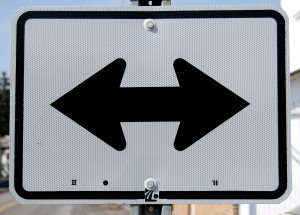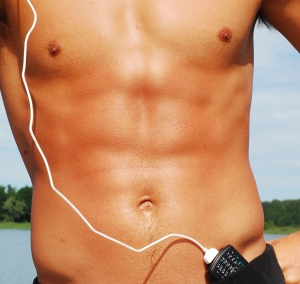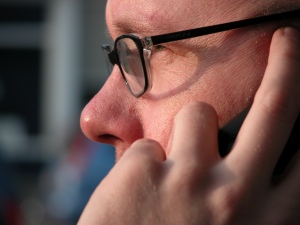Dr. Michael Eades posted recently about something heard often in the Paleo world. It’s a classic.
The whole notion of listening to your body is one of my major pet peeves. In fact, just hearing those words makes me want to puke. In my experience, they are usually uttered by females with moist, dreamy looks in their eyes, but not always. I just read a ton of comments in [a] recent Paleo blog post in which vastly more males than females actually wrote this drivel.
I laughed out loud, because I know exactly what he means. But it also made me realize that so few of us actually know our bodies. Yes, you read that right. Maybe none of us. So what does “listening to our bodies” really mean?
It reminds me of a situation I found myself in last fall. I woke up with a weird headache and was very clumsy with bouts of vertigo. My eyes had trouble focusing on anything, and I quickly gave up on reading my email. When my husband woke up, he asked me what was wrong. I gave him a run-down and he got all concerned looking (not something you want to see from your ER doc husband) and started giving me a neuro physical exam, which I failed with left-sided weakness. Then he kinda freaked out and we started making some phone calls. I was scheduled for an MRI that afternoon. Yay.
I was breastfeeding my daughter at the time, and historically, it had been recommended that mothers bottle-feed their children for 24 hours after having MRI contrast in their systems. Great. We had tried and miserably failed to get Edie to take a bottle, and she wasn’t yet fully on solids. But new research showed that very little gadolinium made its way into breastmilk, less even than the recommended dosage of contrast for infants if they were to have an MRI.
 So I had to make a decision based on conflicting information. And even though I had a doctor to help me, I still had to make a decision for which I had little practical knowledge or understanding. It was then I realized how silly it is for patients to expect equal participation in their health care. Most of us, if we’re being honest, have no way of wading through this stuff. We may as well flip a coin. Sometimes these decisions are cut-and-dried—chemo for cancer, surgery for trauma. But more often than not, we’re left in a murky limbo where nobody knows anything. Even our doctors.
So I had to make a decision based on conflicting information. And even though I had a doctor to help me, I still had to make a decision for which I had little practical knowledge or understanding. It was then I realized how silly it is for patients to expect equal participation in their health care. Most of us, if we’re being honest, have no way of wading through this stuff. We may as well flip a coin. Sometimes these decisions are cut-and-dried—chemo for cancer, surgery for trauma. But more often than not, we’re left in a murky limbo where nobody knows anything. Even our doctors.
(Long story short, I had a strong and weird migraine.)
And so it is with listening to our body. We get conflicting signals. Pre-Primal, I would get cues (shaking, low-energy, extreme hunger) to eat every two hours. So I would feed it. Was it the right thing to do to feed this insulin roller coaster? No, but my body thought so. In a world before chocolate-filled croissants and Frappucinos, if we saw sugar in the form of ripe fruit, our bodies would tell us to go for it. But now? Imagine what it would be like to take advantage of every opportunity you had to eat sugar. Yikes.
And therein lies the problem: it would be easy to listen to our bodies in a paleolithic world. But we live in a neolithic world, so without a pretty strict framework, most of us would probably default to what is most readily available. And we all know that ain’t good.
And what exactly is our body when we say “listening to our body”? Is our body our mind? Brain? Our cells? Our DNA? Where and what, exactly, is our body? To what are we listening? The sensation of hunger can come from so many different places and is probably a complex combination of the brain, hormones, the stomach, our childhood memories, and our mood, to name a few.
I do think it’s possible to truly listen to our bodies, but there’s so much noise out there running interference. Our own minds are masters of deceiving our bodies into all kinds of trouble. And it’s easy to see how others can choose a completely different path. So what is there to do? If we can’t trust ourselves, our doctors, our researchers, our food systems, our friends and family, then where do we go from there?
If we peel back several (thousand?) layers, we can actually listen to our body in regards to nutrition. We have to have some sort of objective basis. But we can’t go too far in that direction, where we end up at Nutritionism, which to me is a bad word. We need some rules, but we don’t need a dietary dictatorship. On top of that, we have to be honest about our own experiences. There’s a long list of things different people think don’t work for them: eggs, nuts, dairy, etc. If it doesn’t seem to agree with you, then you certainly don’t have to eat it, but that doesn’t mean it’s bad for everyone.
Personally, I think there is a general truth in regards to nutrition. As Taubes says, it cannot be possible that different things work for different people. That would be like saying that a chihuahua and a German shepherd need different diets. They don’t. At the cellular level, we are all the same species and those cells have needs that we either are or are not fulfilling appropriately. But this is not to say that there aren’t some specific tweaks that need to be made for each individual.
We need parameters, we need to understand ourselves in a deep authentic way, and we need to relax, all at the same time. There’s a whole world of real food just waiting for us to stop analyzing it long enough to enjoy it.

 06/02/2011
06/02/2011 



Amen! If I listened to my body, I’d be drinking a bottle of diet coke for breakfast, a bottle of chardonnay for dinner and be stuck in the caffeine upper/depressant loop. With fruit loops and guacamole for lunch.
Paleo is about changing our body’s cravings. I think this is one of your best posts and just the encouragement I needed today.
Fruit Loops and guacamole together? ;)
This was an important one for me to write too, after a month of over-indulging in both alcohol and baked goods, even though they were Primal-friendly.
I think listening to my body is important! I just have to differentiate between my mouth (which votes for m&m’s, cookies, and lots of everything) and the rest of my body, which is clearly happier eating real whole foods, and avoiding certain categories. If I didn’t pay attention to what my body wants, and how it reacts to certain foods, I would still be eating the SAD and wondering why I felt like crap 200% of the time. The medical profession certainly did not want to listen to my body, they just wanted to medicate it into compliance. So, I look to my body to let me know what works and what doesn’t, and try to ignore the vote of my mouth.
Bravo! I think this is easier for some people than others. I am one of the lucky ones, but it sounds like a real battle for those with food issues. Awareness is obviously the first step toward truly listening to one’s body.
In my experience though, those foods I thought I’d crave actually don’t taste good anymore. So whatever vote my mouth had is moot. And if I seem off-kilter, like recently, I just extinguish it with lots of good fats. Mmm…ribeyes…
I listen to my body sometimes, but othertimes I over rule it. Right now my body wants to go back to bed. I NEED it to go to work!
I have noticed a lot of my old food cravings are no longer there. Thankfully tater tots don’t taste good any more. Wish I could say the same about pinot grigio.